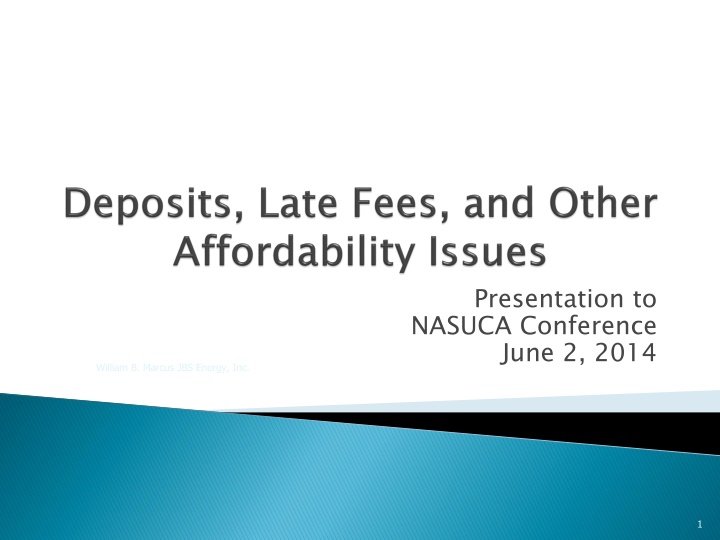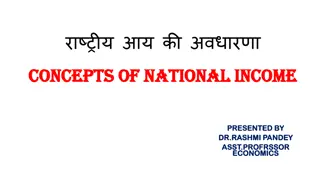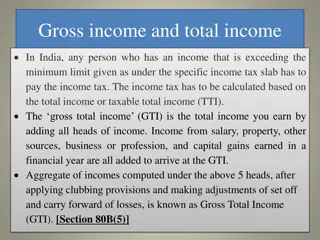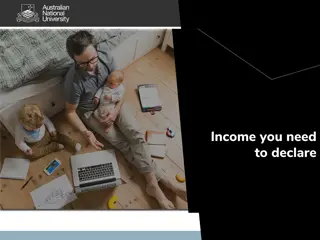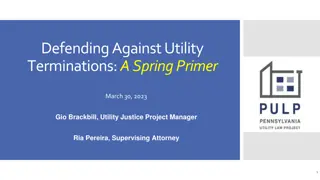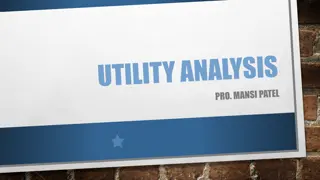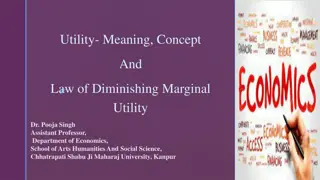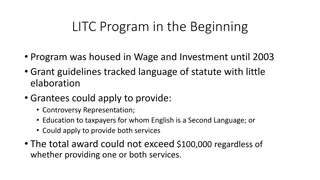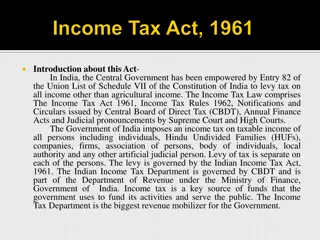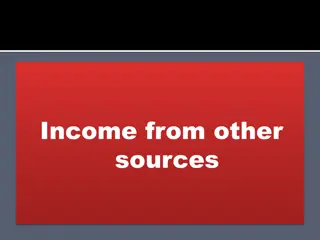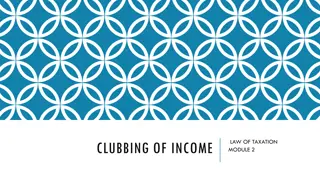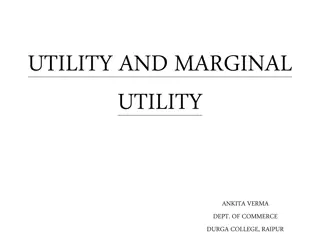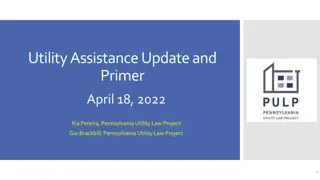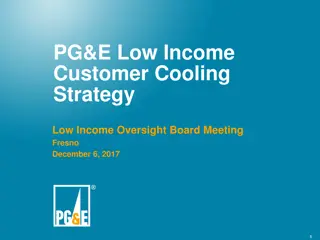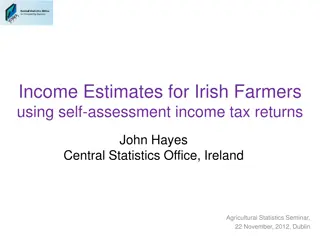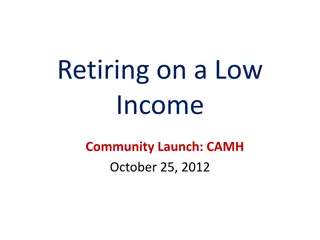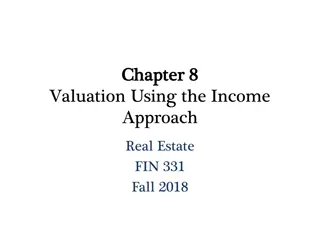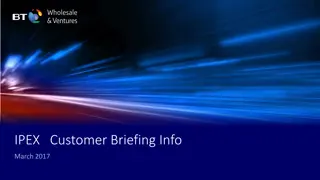Addressing Utility Regulations for Low-Income Customers
This presentation by William B. Marcus of JBS Energy, Inc. discusses model regulations on deposits, shutoffs, and late charges, with a focus on how these issues impact Universal Service and disproportionately affect low-income customers. Marcus reviews draft regulations proposed by Roger Colton, highlighting key points such as deposit limitations, clear disconnection processes, and considerations for billing practices. The presentation also touches on the need for customer-friendly policies and the importance of providing economic analysis in utility operations and rate design.
Uploaded on Feb 17, 2025 | 1 Views
Download Presentation

Please find below an Image/Link to download the presentation.
The content on the website is provided AS IS for your information and personal use only. It may not be sold, licensed, or shared on other websites without obtaining consent from the author.If you encounter any issues during the download, it is possible that the publisher has removed the file from their server.
You are allowed to download the files provided on this website for personal or commercial use, subject to the condition that they are used lawfully. All files are the property of their respective owners.
The content on the website is provided AS IS for your information and personal use only. It may not be sold, licensed, or shared on other websites without obtaining consent from the author.
E N D
Presentation Transcript
Presentation to NASUCA Conference June 2, 2014 William B. Marcus JBS Energy, Inc. 1
I am NOT Roger Colton. He has prepared a series of model regulations on deposits, shutoffs, and late charges, which I can make available. William B. Marcus JBS Energy, Inc. 2
Consulting firm serving consumers, environmentalists, government agencies, and renewable energy producers since 1984 Economic analysis of utility operations, plans, and rate design Manufacture and sell Aquacalc (handheld computer for surface water measurement) If you want Mr. Colton s materials or my powerpoints on this topic or customer charges e-mail me at bill@jbsenergy.com. JBS William B. Marcus JBS Energy, Inc. 3
Deposits Disconnections Late Charges Other Credit-Related Charges All of these issues affect Universal Service and disproportionately harm low-income customers. William B. Marcus JBS Energy, Inc. 4
REVIEW COLTONS DRAFT REGULATIONS Limit scope of deposits Not all new customers Tie to disconnections and past arrearages Limit size of deposits Limit deposits for very low income customers Give customers time to pay deposits Transfer deposits between premises Limit time deposits are held Pay significant interest on deposits William B. Marcus JBS Energy, Inc. 5
REVIEW COLTONS DRAFT REGULATIONS Need clear process for disconnection. Disconnection as last resort. As many chances for customers to pay or make payment arrangements as possible. Make sure customers aren t disconnected for others bills or unregulated services. Medical exceptions (separate Colton draft regulation) William B. Marcus JBS Energy, Inc. 6
Far beyond compensatory to the utility in many states Point raised in Colton model regulations Colton suggests they should apply only to large balances many states do the opposite. Arkansas 5% under $30, 2% over $30. California actually does this largely right. Problems with payment processing Colton model regulation calls for grace days or postmark Maryland and California both had problems with this issue in the past. William B. Marcus JBS Energy, Inc. 7
Field Collection Reconnection Dishonored Checks Service Establishment in next presentation William B. Marcus JBS Energy, Inc. 8
Charge when utility wants to disconnect,but a customer can pay at the last minute. Extremely bad public policy. Don t load up the customer with more fees if they can finally pay the bill. May create more disconnections and bad debt. Charging for telephone calls to customer is even worse. No good records and no incentives for field visit. William B. Marcus JBS Energy, Inc. 9
Public interest in retaining universal service, means that charges, while possibly necessary, should be minimized and not loaded with other fees. William B. Marcus JBS Energy, Inc. 10
Many utilities set them as penalties, rather than to recover costs. Real cost is often $10 or less not $20 or $30. A fraudster won t usually write a bad check for a utility bill. Essentially hits people in financial difficulty. Compounds problems with bad bank practices on deposits, order of checks to be dishonored, etc. William B. Marcus JBS Energy, Inc. 11
Some states allow these kind of charges to be raised between rate cases with little or no review. Opposition to increases in rate cases makes it look like consumer advocates are proposing rate increases. High late fees pay some of the costs of collection charges, so they don t need to reflect costs. Get the green eyeshades out! Utilities often get sloppy and overestimate costs. Poor service quality may exacerbate problems. William B. Marcus JBS Energy, Inc. 12
Deposits must be considered in capital structure or as rate base reduction. Late payment charge should be in the revenue conversion factor along with uncollectibles, reducing future rate increases. The other charges are related to customer activity recover costs that would be O&M costs charged by numbers of customers. Many Commissions allocate these costs by total revenue, thereby making residential customers pay twice. William B. Marcus JBS Energy, Inc. 13
Reduce costs for disconnection and reconnection. BUT MAKES IT EASIER TO DISCONNECT CUSTOMERS REMOTELY Harder to accept last minute payments. Makes it possible to limit service rather than cut it off entirely. Prepayment metering is a huge issue. William B. Marcus JBS Energy, Inc. 14
